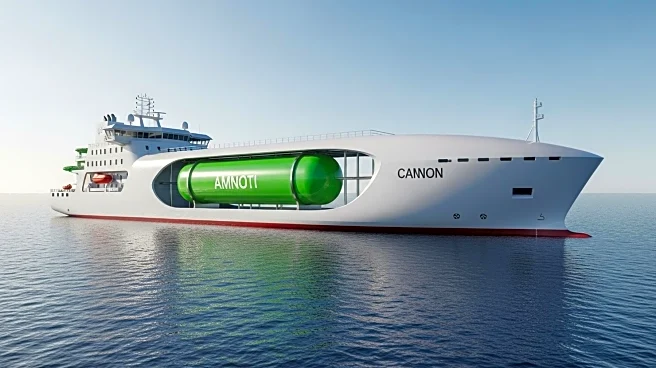What's Happening?
The maritime industry is witnessing a significant shift towards ammonia as a zero-carbon fuel candidate, with nearly 400 ammonia-capable vessels now included in global orderbooks. This development is driven by major regulatory frameworks such as FuelEU Maritime and regional carbon taxation, which highlight ammonia's potential advantages. Despite this progress, the actual consumption of sustainable marine fuels remains minimal. Industry leaders are working to establish safety and operational standards, with Singapore preparing ammonia bunkering guidelines. Itochu Corporation is leading efforts to develop a global ammonia bunkering infrastructure, emphasizing the complexity of maritime decarbonization and the coexistence of multiple fuel types. The regulatory groundwork is underway, with class societies publishing guidelines for ammonia bunkering.
Why It's Important?
The adoption of ammonia as a maritime fuel is crucial for achieving the International Maritime Organization's Net Zero Framework, which aims to limit emissions and set greenhouse gas targets. Ammonia offers unique benefits for long voyages with zero direct carbon emissions, making it a promising option for the bulk and container vessel segments. However, challenges remain in terms of safety, infrastructure, and regulatory compliance. The industry's cautious optimism reflects the potential for ammonia to play a significant role in decarbonizing shipping, although its near-term viability is limited by regulatory and market constraints. The success of ammonia adoption will depend on collaboration among stakeholders and the development of robust regulatory frameworks.
What's Next?
As ammonia infrastructure matures, its adoption will depend on operational readiness, regulatory compliance, and market alignment. The next five years will be critical in determining whether ammonia can transition from a promising candidate to a permanent fixture in shipping's zero-carbon future. Collaborative initiatives and outcomes from upcoming MEPC meetings will guide this process. The industry must address challenges related to emissions data accuracy and fuel characteristics to ensure ammonia's viability as a maritime fuel.
Beyond the Headlines
The shift towards ammonia as a maritime fuel highlights broader implications for the shipping industry, including the need for transparent data collection and strategic adaptation to carbon taxation. The transition to lower-carbon fuels requires empowering marine operators to become co-creators of change rather than passive recipients. This development also underscores the importance of collaboration among industry stakeholders to overcome safety and infrastructure challenges associated with ammonia bunkering.









